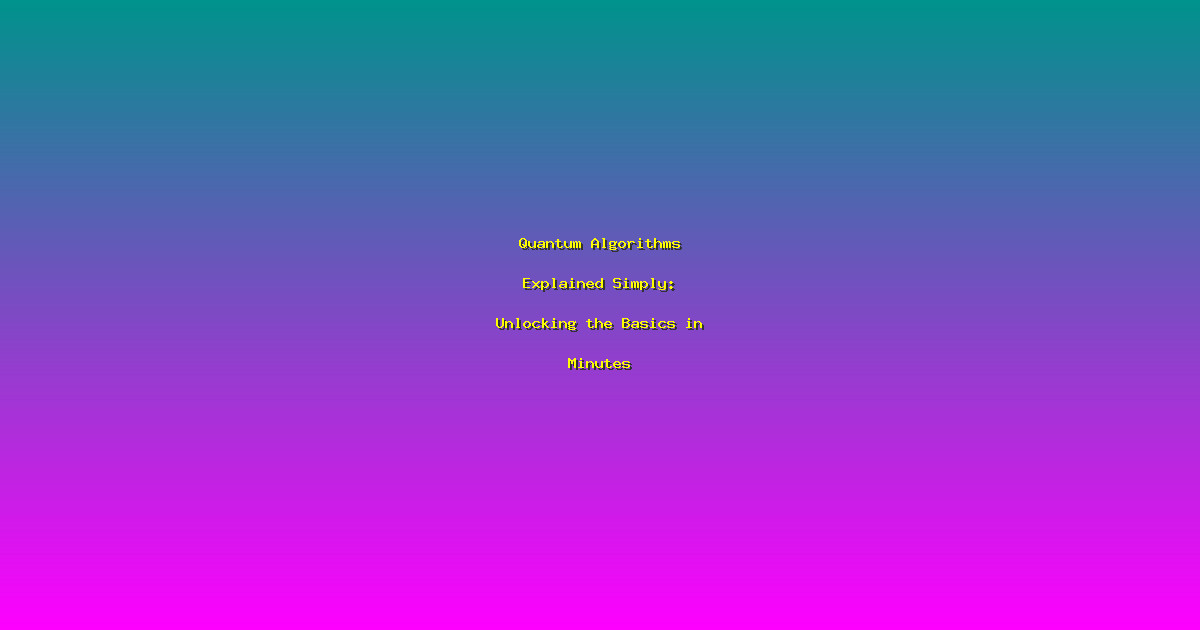Quantum Algorithms Explained Simply: Unlocking the Basics in Minutes
Quantum computing promises to revolutionize the way we solve complex problems by harnessing the unique properties of quantum mechanics. At the heart of this revolution are quantum algorithms, which are designed to run on quantum computers. In this article, we will explore the basics of quantum algorithms and how they differ from classical algorithms.
Understanding Quantum Algorithms
Quantum algorithms are sets of instructions that are executed on a quantum computer. While classical algorithms operate on bits, quantum algorithms operate on quantum bits or qubits. The key advantage of quantum algorithms lies in their ability to perform certain tasks exponentially faster than classical algorithms. This is due to the principles of superposition and entanglement, which allow quantum computers to process massive amounts of information simultaneously.
Key Concepts in Quantum Algorithms
Before we delve into specific examples of quantum algorithms, it's important to understand some key concepts:
- Superposition: Unlike classical bits, which can be either 0 or 1, qubits can exist in a state of 0, 1, or both at the same time.
- Entanglement: Qubits can become entangled, meaning the state of one qubit can instantly affect the state of another, regardless of the distance between them.
- Quantum Interference: By manipulating the probabilities of qubits, quantum algorithms can amplify the correct answers and cancel out the incorrect ones.
Examples of Quantum Algorithms
Several quantum algorithms have been developed that showcase the potential of quantum computing:
- Shor's Algorithm: Used for factoring large numbers, which has significant implications for cryptography.
- Grover's Algorithm: Provides a quadratic speed-up for unstructured search problems.
- Quantum Machine Learning Algorithms: These algorithms can process large datasets more efficiently than classical machine learning methods.
FAQs
1. What makes quantum algorithms faster than classical algorithms?
Quantum algorithms can exploit the principles of superposition and entanglement to perform many calculations simultaneously, which is not possible with classical algorithms.
2. Are quantum algorithms difficult to understand?
While the underlying principles of quantum mechanics can be complex, the basic concepts of quantum algorithms can be understood with a bit of study and explanation.
3. When will quantum algorithms be widely used?
The widespread adoption of quantum algorithms depends on the development of more advanced and stable quantum computers. As technology progresses, so will the practical applications of quantum algorithms.
4. Can anyone learn quantum algorithms?
Yes, anyone with an interest in learning can understand the basics of quantum algorithms. However, a deeper understanding often requires knowledge of quantum mechanics and linear algebra.
5. What are some real-world applications of quantum algorithms?
Quantum algorithms are being explored for various applications, including cryptography, drug discovery, financial modeling, and optimization problems.
6. How do quantum algorithms differ from classical algorithms?
Quantum algorithms leverage the principles of quantum mechanics, allowing for the manipulation of qubits in ways that classical bits cannot be manipulated, leading to potentially much faster computations for certain types of problems.
Conclusion and Call to Action
Quantum algorithms represent a promising frontier in computing, offering solutions to problems that are currently intractable for classical computers. By understanding the basics of these algorithms, you can begin to appreciate the potential of quantum computing and its impact on future technological advancements. To further explore this fascinating field, consider diving deeper into the specific algorithms and the principles of quantum mechanics that underpin them.

